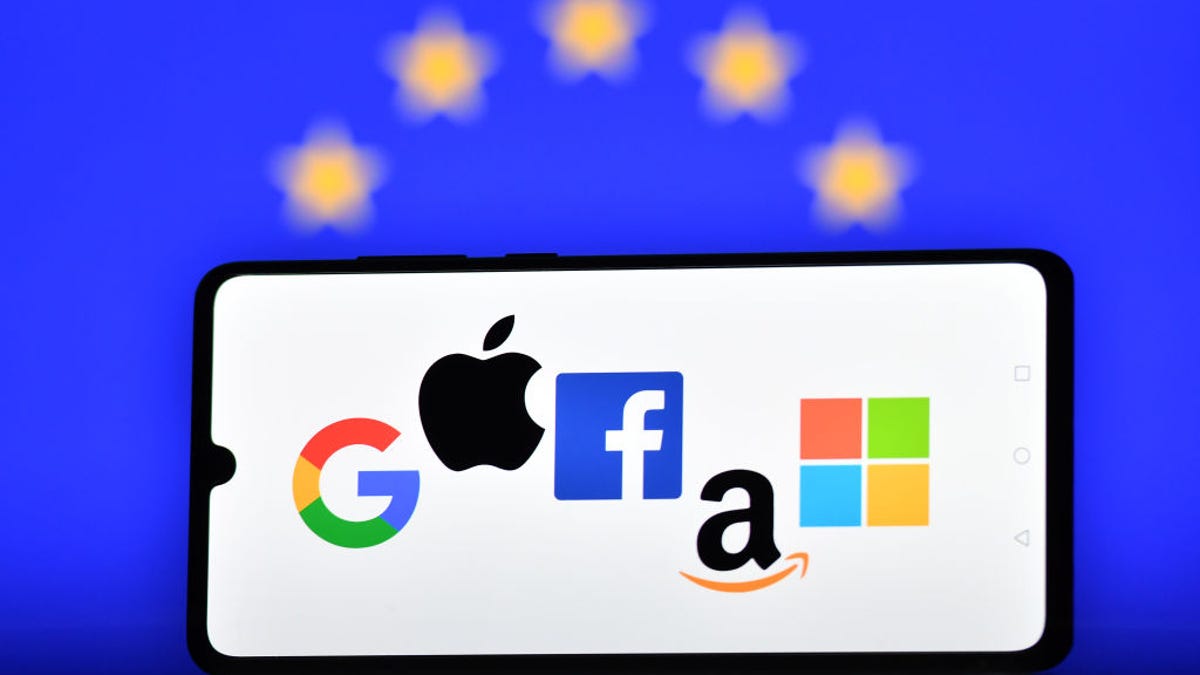A New Law Would Force Facebook Messenger and Apple iMessage to Talk to Each Other. Here's How
Officials say the EU's Digital Markets Act "puts an end to the ever-increasing dominance of Big Tech companies," opening the door for fairer competition.

The Digital Markets Act would require online giants like Facebook, Google and Amazon to make their platforms more interoperable.
Landmark European Union legislation could mean WhatsApp, Facebook Messenger and Apple's iMessage will have to let their users communicate with one another.
Approved by EU members on Friday and awaiting official adoption, the Digital Markets Act is aimed at regulating massive "gatekeeper" providers, requiring them to exchange more information between services and provide space for smaller platforms to thrive in the market. In theory, it could allow consumers to choose between installing Siri or Alexa on their smartphone, regardless of what device they owned.
The goal of the act isn't to break tech companies apart but to "break them open," France's minister of state for the digital sector, Cédric O, said during a press conference.
"We have taken a step I think we can call historic," he said. "It goes well beyond the digital, and affects democracy as well."
What would the Digital Markets Act do?
The legislation targets what it calls gatekeeper providers -- EU lawmakers cited WhatsApp, Facebook Messenger and Apple's iMessage by name in a statement -- saying they would "have to open up and interoperate with smaller messaging platforms," like Signal, Discord or Telegram.
"Users of small or big platforms would then be able to exchange messages, send files or make video calls across messaging apps," the European Parliament and Council of the European Union said in the statement.
If the EU has its way, messaging apps from different companies will be able to talk to one another.
Negotiators added language in the DMA that would let users freely choose which browser, virtual assistant and search engine to use on their phone, tablet or computer. But the committee said interactivity of other features would be looked at down the line.
Other requirements include:
- Allowing third-party services (like messenger apps) to interact with gatekeeper systems.
- Letting users access services they may've acquired outside of a gatekeeper platform.
- Enabling users to uninstall any pre-installed software or apps.
- Allowing companies that advertise on gatekeeper platforms to access performance-measuring tools.
- Letting business users access data generated by their activities.
What companies would be impacted by the DMA?
The DMA includes any company that provides web browsers, social media services, messaging apps or other online services to at least 45 million EU users, or 10,000 businesses, and has a market capitalization of at least 75 billion euros (about $82 billion).
That rarified group includes Amazon, Alphabet (which owns Google and YouTube), Apple, Meta (parent company of Facebook and Instagram) and Microsoft.
Notably, the DMA would force Apple to let companies like Epic Games use third-party payment methods in its App Store, which currently collects a 30% commission, and allow alternatives to the App Store for downloading apps.
Meta and Google would be further limited in sending members targeted ads without consent, and Amazon would be blocked from collecting data from third-party sellers on its platform in order to offer competing products.
What would this mean for Big Tech?
If a gatekeeper doesn't comply with the rules, the commission can levy fines of up to 10% of the company's global revenue and 20% in the event of a second violation. If a gatekeeper continues to violate the DMA, "structural" repercussions could be imposed, including a possible breakup of the company, CNBC reported.
The Digital Markets Act "ushers in a new era of tech regulation worldwide," Andreas Schwab, a representative of Parliament's Internal Market and Consumer Protection Committee, said in a statement.
The legislation "puts an end to the ever-increasing dominance of Big Tech companies" and allows for fairer competition on the internet, Schwab said.
Will the Digital Markets Act affect American users?
Technically, the DMA is enforceable only in EU countries. But cyberspace rarely recognizes geopolitical boundaries. It's highly unlikely Facebook or Twitter would create separate platforms for different continents.
When the EU passed the General Data Protection Regulation in 2018, requiring sites to ask permission to track users' data with cookies, Americans reaped the benefits too.
What's the next step?
Though the law has been approved by EU member states, the language still needs to be finalized and approved by both Parliament and the Council, then officially adopted by the 27 countries that make up the EU, but that's considered more of a formality.
EU competition chief Margrethe Vestager said she expects the regulations could start being enforced sometime in October.

